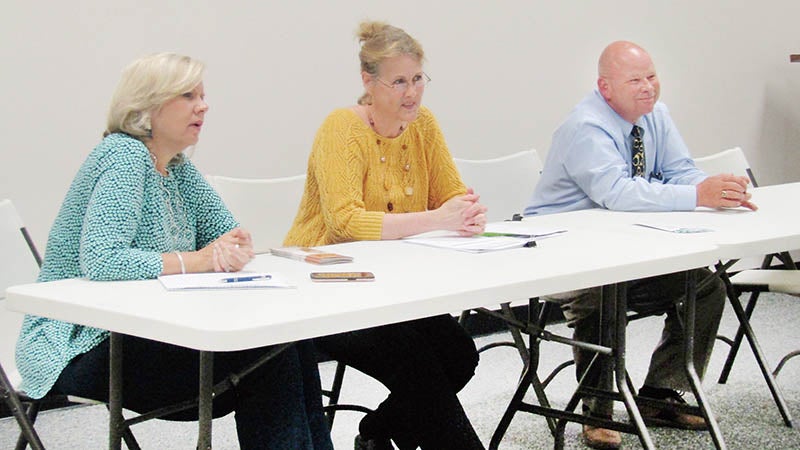Avoiding identity fraud
Published 10:46 am Tuesday, May 15, 2018

- From left, Meg Hall and Donna Edwards of Southern Bank in Jackson joined with Northampton County Sheriff’s Investigator Alan Roye at a forum held recently at the Northampton Memorial Library where attendees learned ways to prevent identity theft/fraud.
Submitted by Pam Brett
Branch Manager
Northampton Memorial Library
JACKSON – Identity fraud is something that we all would like to avoid if at all possible, but there are many that have fallen victim to such scams.
The best way to avoid being taken in by such people is to educate yourself about how these people work. This is not something that has just started, but it is a growing “business” that can affect any one of us.
At a recent forum held at the Northampton Memorial Library, Meg Hall and Donna Edwards from Southern Bank in Jackson shared information concerning identity theft, how they deal with such things and what the public can do to protect themselves from being used in this way.
One thing to be careful of is when making online purchases. Be sure to use only secure websites and monitor your bank account online or with your monthly paper statements. Immediately report it to your financial institution if something is not right. The bank will block your card if something doesn’t look right. You would be amazed at some of the things that people will do to get your money. They will even go so far as to go through your trash to find the numbers that they need to access your accounts.
Southern Bank has Fraud Prevention on their website. You can print out an annual credit report to see if someone if trying to establish credit in your name.
You also need to be aware of your children’s accounts and personal information. When a child’s information is stolen it can put the parent in a bad way. Children’s records at school or a doctor’s office can be stolen by others if not monitored consistently.
Hall and Edwards also shared that it is never a good idea to give out personal information over the phone. If you are not the one initiating the call, don’t tell them anything. The best way to handle such a situation is to ask for their phone number and call them back. Another thing that it is a good idea to avoid is putting checks in a mailbox in your yard.
Another good idea is avoiding Online Mortgage companies. Before dealing with one of these it is a good idea to check with the Better Business Bureau to see if they are legitimate. They will try to produce fake liens and mortgages saying that you owe them money. If you have questions or think that you don’t owe any more money, go to your county’s Register of Deeds office. They should have all the information about any mortgages that you may have had or still have. Another thing that you can do to find out if this a legitimate call is to look them up on www.gov.org.
Alan “Bobo” Roye from the Northampton Sheriff’s Office was also available at the forum to share some things to protect yourself from Identity Fraud. The very day of the forum, Roye was working on a case in court in Jackson involving a woman who stole the ID of a coworker.
“It can happen to you at any time and anywhere,” Roye said. “When you think that someone has gotten into your account, the first thing that you need to do is to alert your financial institution and then they will encourage you to call law enforcement to follow up.”
One thing that can make it difficult to follow up on these scammers is that most of them do not use their real names and a lot of them live outside of the United States, Roye noted. That makes it very difficult to follow up, file charges and place them in jail. The Federal Government may put some pressure on the foreign governments and it may help deter this kind of activity, but nothing can stop it completely.
There is a popular way to get money out of people, especially older people, called the “Grandparent Scam”. This is where someone, usually a younger person, will call and talk real friendly to the older person and try to make them think they are a long lost relative. The phone conversation will sound a bit like the following:
“I have gotten myself into a little trouble and I need your help to get out of jail. All you have to do is to go buy a Green Dot card and give me the number on the back of the card and I can get out of jail.”
Roye stated that these scammers don’t care who they hurt. It is easy to prey on the old and lonely. Things like this can ruin your credit and it is not easy to get it straightened out; it takes a lot of work.
Someone might call you and tell you that you have won $50,000 but to claim it you have to send them $450 dollars. No! That will never work.
No matter how many precautions you take or what you do to try to protect yourself, no system is 100 percent secure. When making payments online or over the phone the less information that you give the better off you are.
Be careful about donating to sound alike charities. You may get information in the mail or get a phone call asking for money for this charity that sounds a lot like a legitimate charity, but it is just a fraud. Check things out before giving money to anyone, even if you believe it is a trustworthy business. You can never be too careful.
For more information about what you can do to protect yourself, check with your local financial institution and your local law enforcement agency.


